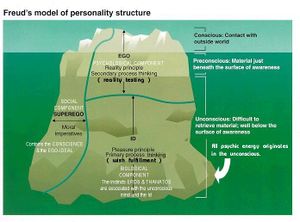Freudian psychology
Freudian psychology (not to be confused with the study of psychos known as psychoanalysis) is the body of thought that comprises Sigmund Freud's perverted ideas about human sexuality and its developmental relationships to the evolution of human consciousness, preconsciousness, and unconsciousness (which are, in psychology, what passes for personality).
As the model for his views, he chose Heidi Klum, but she was unavailable, so he selected an iceberg to represent the structure of personality as he saw (or, actually, as he did not see) it.
Unconsciousness, Preconsciousness, and Consciousness[edit | edit source]
Since the vast majority of an iceberg is underwater and cannot be seen, Freud had to adapt his notions about the human personality to this limitation; his solution was to invent what he called the "unconscious mind," the "preconscious mind," and the "conscious mind." Basically, he stole this triune structure of personality from Christianity's doctrine of the Holy Trinity, viewing the human personality as a threefold structure similar, in its own blasphemous way, to the threefold nature of God as a Spirit consisting of three persons. These levels, or aspects, of personality ran through all three components of the personality: the id, the superego, and the ego. If this picture of the human personality seems more complex than it needs to be, remember the iceberg model or metaphor or whatever it's supposed to be.
Extra-sensory perception (ESP), including clairvoyance, precognition, retrocongnition, telekinesis, aura analysis, clairsentience, telepathy, clairgustance, astral projection, psychometry, and psychokinesis have their bases, Freud says, in the unconscious mind, which is awhirl with inconsistencies, contradictions, and disconnected electro-chemical impulses as well as "all psychic energy."
Id[edit | edit source]
The id is similar to the reptilian brain (or, as it is known in science, the brain stem).
Freud imagined theorized that the id is a sort of light olive-drab green with darker shades, resulting primarily from the effects of shadows of its icy ledges and other outcroppings. The id, he said, is "the portion of the iceberg of human personality" that is submerged to a depth of several miles beneath the surface of "the sea of life." As such, it was the reservoir of primeval instincts associated with hoarding, dominance, preening, and was driven, as it were, by a need for sex, sex, and more sex. Since the id was well below the surface of the sea of life, its urges could be located only by submarine or, in rare cases, the use of sonar. Freud argued that the basic emotions (love, fear, hate, and, especially, lust stemmed from the id and that reason, as a sort of physiological afterthought, evolved many millions of years later, producing, at its peak, the brilliant mind of the clear-thinking Sigmund Freud.
A dark green line separates the id from its rivals, the superego and the ego.
Superego[edit | edit source]
Freud imagined supposed believed theorized that the supergo was born of the amphibian brain.
There was more to the iceberg than even the unconscious mind’s vast dimensions could account for, so Freud next invented the superego, which, he said, is the social component of the personality. This is perhaps Freud’s most unimaginative invention, for it amounts to little more than the conscience, re-christened. Containing the conscience and the ill-defined "ego ideal," the preconscious is also mostly unconscious but also has both a preconscious and a conscious element. Informed by values based on ideas of "right" and "wrong" invented by society for its own purposes and foisted upon the infantile individual through a system of rewards and punishments administed by parents, the dictates of the superego, often at odds with those of the id, drive the superego in its attempt to realize its ego-ideal or true self. One might think of the superego as the land, as it were, of moral imperatives.
Unlike the id, the superego is partly conscious and partly preconscious. However, it is mostly unconscious.
According to Freud's fantasies, the superego, like the id, is a sort of light olive-drab green with darker shades, resulting primarily from the effects of shadows of its icy ledges and other outcroppings.
A dark green line separates the superego from its rivals, the id and the ego.
Ego[edit | edit source]
The ego was a procuct, or "gift," Freud said, of the mammalian brain.
Like the superego, the ego is partly conscious and partly preconscious. Like the superego, it is also partly unconscious, but whereas the superego is mostly unconscious, the ego is approximately one third conscious, one third preconscious, and one third unconscious. It is supposedly the psychological component of personality and operates according to the reality principle. The ego mediates between the outer world and the inner world, like a doorway or an anus, and resolves conflicts between the competing demands of the superego and the id.
In color, the ego is white at the top, with gray accents; pale olive-drab green in the middle, with darker, but still light, olive-drab green highlights; and light olive-drab green at the bottom, with dark olive-green shadows.
A dark green line separates the ego from its rivals, the superego and the id.
Sex[edit | edit source]
Freud believed, correctly, that everybody wants to fuck their parents. He discovered this while simultaneously high on opium and cocaine while smoking a cigar and looking transfixed at his mother. It is now nearly universally accepted that children want to fuck their parents.
Child raising[edit | edit source]
According to Freud, all mental disorders are caused by repressed sexual feelings, so logically, the best way to avoid mental disorders is to get that desire for wincest out the way early on and thus it is suggested that families, especially those with young children, engage in regular orgies to prevent feelings from being repressed.
Other Stuff[edit | edit source]
Freud was not content in having charted the uncharted waters of the human personality. After mapping the structure of reason and unreason, logic and desire, consciousness and unconsciousness (and preconsciousness), he added such influential concepts to the embryonic field of psychology, known, at the time, as Psych 101, as:
- The oral sex, anal sex, and genital sex stages of psychosexual development
- Penis envy
- Castration complex (also known as the Oedipus or the Electra complex)
Significance[edit | edit source]
Initially, Freud was regarded as a god among men and his views concerning the nature and function of human personality were considered the beginning (alpha) and the ending (omega) of psychology. Nothing more need be said about motivation, cognition, socialization, habit, emotion, will, imagination, or any other aspect of human thought or behavior, for Freud, it was believed, had said it all.
However, when he was unable to produce the id, the superego, or the ego for inspection by other scientists, who wanted to examine and weigh them, take their temperatures and test their reflexes, and ask them a few hundred thousand questions about themselves, even his admirers began to doubt whether such entities actually existed.
Freudian psychology, it was suggested, seemed really to be more about Freud himself than anyone or anything else. Some suggested that he was more a mythmaker than a psychologist and that his theories were more mythological than scientific, especially since he could not produce his “discoveries” for the impartial examination of others.
Moreover, many boys objected to the idea that they wanted to kill their fathers and have sex with their mothers, claiming only to have been motivated by one or the other of the two impulses and not by both, and girls complained that they were very happy with their vaginas, thank you very much, and never wanted to possess a penis (in the sense of having one of their own, at least).
Slowly, Freudian psychology declined in importance as fewer and fewer people believed its absurd proclamations until, today, it is little more than a curiosity in the anus annals of psychology.



